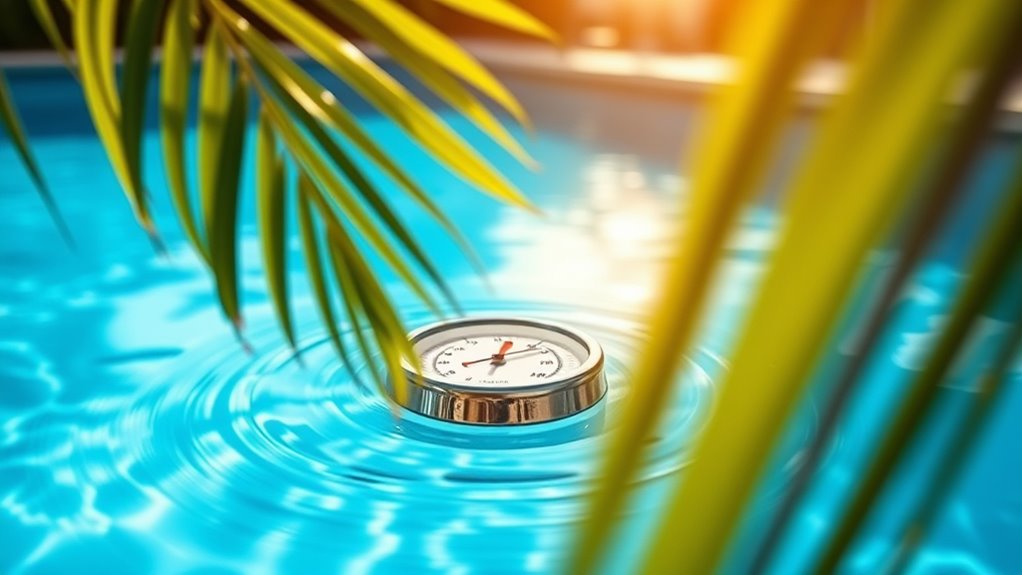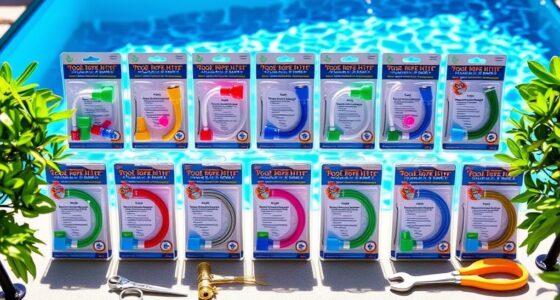Monitoring water temperatures in your pool is vital for guaranteeing comfort and safety. Using the right thermometer helps maintain ideal temperatures for enjoyment, efficiency, and chemical effectiveness. You can choose from analog, digital, smart, or infrared models based on your needs. Features like display size, durability, and wireless connectivity enhance usability. Regular maintenance of your thermometer guarantees accurate readings and prolongs its life. Stick around to explore more about the best options available for your pool!
Key Takeaways
- Pool thermometers help ensure comfortable water temperatures for enjoyable swimming experiences and effective use of pool chemicals.
- Different types of thermometers, such as digital and smart models, provide accurate and convenient temperature readings.
- Features like large displays and wireless connectivity enhance the usability and monitoring capabilities of pool thermometers.
- Regular maintenance, including cleaning and battery checks, is essential for accurate and reliable temperature readings.
- Accurate monitoring of water temperatures protects pool equipment and reduces energy costs by maintaining optimal conditions.

When it comes to enjoying your pool, knowing the right temperature can make all the difference. Whether you prefer a revitalizing dip on a hot day or a warm soak during cooler evenings, the temperature of your pool water directly impacts your comfort and enjoyment. That’s why investing in an accurate pool thermometer is essential. With various types available, you can choose one that suits your needs and preferences.
Analog thermometers are traditional options that use bimetallic coils or liquid-filled glass tubes to measure temperature. They’re generally budget-friendly but may lack the precision of digital models. Digital thermometers, on the other hand, utilize electronic sensors to provide quick and accurate readings displayed on an easy-to-read LCD screen. If you’re tech-savvy, smart thermometers offer features like Wi-Fi connectivity and app compatibility, allowing you to monitor your pool’s temperature remotely.
Infrared thermometers are another innovative choice, measuring temperature without direct contact, making them great for quick checks. Floating thermometers, designed to remain afloat on the water’s surface, provide continuous readings and are easy to spot. No matter which type you choose, guaranteeing precision in temperature monitoring is essential for several reasons.
For starters, maintaining the proper temperature guarantees a consistent and enjoyable experience for you and your guests. Additionally, many pool chemicals function best within specific temperature ranges, so keeping an eye on the temperature can enhance their effectiveness. Some equipment also operates ideally at certain temperatures, protecting your investment over time. Incorrect water temperatures can pose health risks, leading to discomfort or even accidents. Furthermore, maintaining preferred temperatures can help save on energy costs, making your pool more economical to run.
When selecting a thermometer, look for key features like display size, clarity, and durability. A large, clear display makes it easy to read from a distance, while durable materials can withstand exposure to pool chemicals and weather. Consider models with wireless connectivity for remote monitoring and alert systems to notify you if temperatures exceed set ranges.
To keep your thermometer in top shape, handle it carefully, especially when adding chemicals. Store it away from extreme temperatures and direct sunlight when not in use, and regularly clean it to guarantee accurate readings.
Frequently Asked Questions
How Do I Calibrate My Pool Thermometer?
To calibrate your thermometer, start with an ice water mixture, aiming for 32°F (0°C).
Immerse the thermometer’s sensor in the slushy mix for about 10-15 minutes. After stabilizing, check the reading.
If it’s off, adjust the needle for dial types or press the calibration button for digital models.
Finally, confirm it reads within -0.5˚C to +0.5˚C. Regular checks guarantee accurate readings and extend your thermometer’s lifespan.
Can Pool Thermometers Measure Air Temperature Too?
Did you know that some pool thermometers can measure air temperature, although they aren’t specifically designed for it?
While most are built primarily for water, a few models allow for air readings by placing them in the shade.
Just remember, they may take a bit longer to stabilize when measuring air, so patience is key.
For accurate results, make sure you’re using the thermometer within its intended temperature range and conditions.
Are There Solar-Powered Pool Thermometers Available?
Yes, there are solar-powered pool thermometers available.
These devices harness solar energy, eliminating the need for battery replacements, making them eco-friendly and cost-effective.
You’ll find models that feature clear digital displays, waterproof designs, and accurate temperature readings.
Some even float on the water’s surface for easy use.
When you choose a solar-powered option, you’re investing in convenience and reliability for monitoring your pool’s temperature efficiently.
What Materials Are Pool Thermometers Typically Made From?
Think of pool thermometers as the superheroes of temperature monitoring, clad in durable armor.
Typically, you’ll find them made from stainless steel for probes, ensuring they stand tough against corrosion. The body often features high-quality plastics or polycarbonate, built to resist chemicals and UV rays.
Silicone sealing rings keep them watertight, while heavy-duty casings provide added protection. These materials work together, ensuring your thermometer remains reliable and accurate in any aquatic adventure.
How Long Do Pool Thermometers Usually Last?
When considering how long thermometers usually last, you’ll find that it varies based on the type and usage.
For instance, some battery-operated models can last anywhere from 2 to 5 years with regular maintenance.
If you keep them clean and store them properly, their lifespan can extend even further.
Always check the manufacturer’s specifications for more accurate information regarding battery life and longevity to guarantee you get the most out of your thermometer.
Conclusion
In conclusion, using a pool thermometer is essential for maintaining the perfect swimming environment. Imagine planning a weekend pool party only to find the water’s too cold for everyone to enjoy. By regularly monitoring the temperature, you can guarantee your guests have a great time, like when the Johnsons hosted their summer bash, keeping their pool at a comfortable 82°F, making it the highlight of the season. So, invest in a reliable thermometer and plunge into comfort!









